SAN SNOOPY:
In Cansano, Jack, Ashley, Marin, and I crashed with my dad’s first cousins, Rocco and Panfilo. The fratelli duo own an Agriturismo at the top of the mountain town, across the street from the house my grandmother grew up in. They graciously let us stay free of charge. I’ve visited here three times in the past, as my dad was very close with his late zio, Pietro (Rocco and Panfilo’s padre). This was the first time I’ve come without my dad and as an adult, and this meant that our crew had to rely on my Italian skills - a challenge for me, as in the past I leaned entirely on my dad’s fluency. After the trip, my dad said “now you know how I felt taking you and your siblings when you were younger,” and I had honestly taken this for granted. Thanks Dad. When translating, I never quite relaxed. My brain was working in 200% mode - interpreting, translating to English, figuring out a timely response, translating and spitting it out in Italian, all while trying to make conversation that doesn’t sound like a 4 year old. It was easy to get caught in conversations like: “Jack is Italian too, and his dad is from San Francisco but is Sicilian, and his mom is Mexican, and she’s from LA, and Ashley is from Texas, and,” you know? Just listing random details with no nuance like a 2nd grader is easy to fall into. At the end of the night I would sometimes be so stimulated from all the brain work that I’d find myself pacing around the apartment, mentally noting phrases, and rerunning conversations to consider if they were accurate.
Rocco knows some English, and Panfilo knows practically none (besides some choice phrases that I will detail later). I’d been studying Italian for about an hour every morning for three months in preparation of the trip. I’ve also been doing Italian audio books any time I’m doing chores. Cansano, like a lot of villages in Abruzzo, is a Middle Age era commune that never quite recovered from WWII. Travelers in Rome don’t really need to know Italian tbh, as inglese is abundant and well spoken. But in these rural villages, many of the older folk don’t have proper schooling. For example, my grandpa Emiliano only was in school until 5th grade, and certainly was not taught English. He ultimately learned English in America with the help of my dad and aunts. Just ordering at the one restaurant, cafe, and bar in town can become stressful if you don’t know a few verbs and nouns. Despite my studying, we got into one awkward conversation with a sever in the small nearby town of Pacentro (which Cansano was a frazione of until 1855.) I asked our server about the prefixed meal, and then had no ability to move on from that question. Any food we tried to order afterwards he thought we were trying to incorporate into the prefixed structure. Sometimes you have to stoop to a toddler’s level of saying “no” and pointing. I apologized to him for us being SO American, and the Signore made an owl-like facial expression with his eyes, and cringed at me in an unforgettable way. Funny enough, I remember this exact man severing my family at the same restaurant years ago, and my dad absolutely rizzing him up in Italian. We were treated like kings then.
The lower half of Cansano (where my grandpa Emiliano’s childhood house is) is still completely destroyed from WWII. Growing up, my Grandpa Emiliano would often tell me stories of WWII - Americans dropping bombs disguised as candy and watches, an older family member of his being thrown from a window, and other horrible things. His family was made homeless during the war, and survived eating dandelions and various other greens in the Abruzzo mountainside. The Cansanese folk who immigrated to Colorado call this area “La Partayova” while the current day residents refer to it as “La Parta Vecchia”. Emilano’s childhood home is now a shell of the original, lacking a door, hazardous, overgrown with greenery, and home to a family of stray cats. Due to Italy’s strange property laws, I technically own a portion of the land, of which I am joyous to share rent-free with the cats. My grandpa actually loved cats, and had a few outdoors ones that he adored. He passed in 2019, and I’m not going to lie, seeing cats laying out on the property brought a tear to my eye. I can imagine his spirit resting there now, maybe even reincarnated in one of the cats, spending his days running up the cobble stairs of his youth, and lounging in the grass that overlooks the valley before Sulmona.
Many people from this parta (including a lot of my family) immigrated after WWII to Australia, Canada, Argentina, and the US. Because of this, the local economy never fully recovered, and there are now only 250 people who live there. For perspective, between 1951 and 1961 the population of Cansano dropped by 45%, and in 1911 the population was 1,834. My dad’s family lineage for over 400 years can be traced entirely to this town. The cemetery is lined with family names, and even several Donato Ruscittis. I feel grateful to have a physical place that I can connect with and trace so much of my family’s history to - something that I think is only becoming rarer, especially as an American. Pietro was the only Ruscitti fratello who stayed in Italy after WWII, though he had a short stint in Argentina like many Italians. He remained living in Cansano up until his death in 2019, still tending to his lamb farm just below the snow capped mountain of La Maiella.
Rocco is a farmer by morning, a pharmacist by day, and a bread & breakfast operator by night. He owns three pharmacies across neighboring villages, and seems to always be working. Rocco is obsessed with American culture - he dresses in dope western inspired clothes, wool sweaters, denim jackets, corduroy pants, and cool hats that I couldn’t even tell you where you could buy. Just picture an Italian lamb farmer in the mountains of Abruzzo dressing like a total boss. Rocco is also very passionate about music - he’s a fan of John Coltrane, Johnny Cash, and every good American artist in between that you could think of. He bragged to us about seeing Thelonious Monk at Umbria jazz fest in the late 70s, and sang us songs on his beat-up guitar (whose vintage neck was repaired crudely with some wooden screws, making the action difficult to play on). Each night Rocco rolled his own cigarettes proudly using “west-Virginian” tobacco, and left them dangling out of his mouth while singing to us. “Quanti soldi vuoi!!” has been ringing through my head ever since his performance over un grande supply of Montepulciano d’Abruzzo. The lyric translates to “how much money do you want” and obviously refers to a divorce. I asked if he wrote it, and he got a good kick out of that, laughing and shaking his hands quickly to say no. Rocco also taught and oversaw us playing a classic Neapolitan card game called “Scopa”. Neapolitan cards are different than playing cards in the US. They have no numbers or lettering. For example, The Donna card represents the number otto, and is signified with a drawing of a woman. Only problem is, there’s very little way to tell that it’s a Donna, or a joker, or several other card types. Rocco taught us the game in Italian, and we slowly picked it up and had a blast playing with him. If only Rocco could come to NYC and moderate all my game nights with friends.
The late nights with Rocco seemed equally rewarding to him as they did to us. He’s 67 years old and I can’t imagine that he often stays up past midnight playing cards, signing songs, and drinking del vino with late 20 somethings. But he truly loves family, and told me repeatedly that it was his joy to spend time with us. I’m so grateful to have the connection with him, and he’s a kind man. Spending time with him offers me a glimpse into an alternate reality of my father if my grandparents hadn’t immigrated to the US.
Panfilo equally offers a view into my family history, but also into the humor and personality that many of my family members share. He too works the lamb farm, and also drives a recycling truck in the early morning. The due fratelli work harder than any American I’ve ever met. Panfilo closely resembles my grandpa and great uncles. He dresses old school, touting button-ups tucked into pants, even while working the farm. Anche, the uomo and I have a great online repertoire, as he is a HUGE fan of snoopy (anche io). We are the premier Snoopy fan Ruscittis. Though, when I showed him my snoopy tattoos (multiple) he didn’t seem too pleased. In person, communication with him was difficult. I believe he speaks with a more Abruzzese accent than his brother. And furthermore, he speaks exclusively in jokes, which I can only sniff out when he starts giggling and yanking on his ear to indicate his bit. Throughout the trip Jack and Ashley would remark on how similar his joking style was to mine.
Our last lunch happened to coincide with the festival of Saint Panfilo, his namesake, and he had loads of fun making jokes around this subject. He came with a huge platter of dolci from the festival and presented it to us as a sweet gift. Throughout the trip he would alternate between calling himself and myself “A SNOOPY”, and describing anyone he liked also as “A SNOOPY”. Example, shortly after introducing me to Roberto in the piazza, he says to me “ROBERTO IS A SNOOPY”. When I slept in una mattina, he would see me dopo in the piazza and yell “SNOOPY SLEEPS”. On Festa di San Panfilo, Patrono di Sulmona, he kept saying “FESTA DI SAN SNOOPY”. Throughout lunch would also yell “SNOOPY IS CRAZY,” which perfectly matched our online conversations prior to the trip. Panfilo writes exclusively in caps lock and sends me an image of snoopy alongside a heartfelt message in Italian almost every day. The gentleman has caps lock sempre on. In response to Snoopy’s outbursts, Rocco would say “Yes, he is crazy, it is a small problem”. CIAO BELLA, BUONGIORNO, SNOOPY IS CRAZY.
Throughout the courses (much of which was agnello and formaggio from their fattoria, and verdure from the marcato di Sulmona), Panfilo and Rocco wouldn’t let us clear any of the piatti (and would become upset when we tried). The first night Marin demanded that they let her lavare the dishes, ma by the end of the trip they simply wouldn’t let us. Panfilo clearly studied some English phrases as the days progressed, and while clearing the plates on our last lunch he looked boldly at Jack and Ashley and in a high-pitched, Mickey Mouse voice peeped “HELP ME”. Which quickly became our group’s catchphrase for the remainder of the trip. SNOOPY IS CRAZY, HELP ME.
Rocco and Panfilo both acted as tour guides for us, and connected us with various townspeople to gain access into shuttered churches. On the first night in Cansano, our crew tried entering Chiesa di San Rocco, but were met with a locked door. Shortly after the attempt, a nun rolled out speaking in unintelligible Italian. At this very moment Panfilo rolled up in his car, just in time to rescue us. The lady quickly became excited after speaking with him, and offered to take us into the church basement. Suddenly, we were touring a strange basement of an ancient church viewing hundred years old sculptures with a nun. Talk about side quests - this was not on our bingo card. The situation culminated in a room with a life-sized sculpture of Gesù morto. Honestly, at this point we were all a tad scared and ready to go. Kudos to the nice lady for showing us the artifacts tho, only respect.
Rocco later connected me with an older lady named Livia Ruscitti, who shares our last name by marriage. She met us at the Chiesa di San Nicola di Bari, a chiesa the top of Cansano that closed after a bad earthquake in 2009. Apparently Livia holds the chiavi for ogni chiesa in town, and is incredibly passionate about Cansano storia. Accordingly, she was more than happy to show us around. Rocco pawned us off to her so he could get back to work, and without blinking an eye, we were now being driven all around by an old Italian lady just minutes after meeting her. Learn to roll with it, andiamo! She spoke very clear, and I communicated the best with her of anyone in Abruzzo. I think this was due to her professional speaking style and slower cadence. She said she went to scuola with my grandma Maria, and told me that I had to call and tell her Ciao. Livia smiled so big while walking us around, all the while smoking a cigarette. She even became a mini tour guide, explaining the local musei, local art work, and pointed up towards her house - nestled at the top of the west side of the commune, with finestre overlooking the valley and mountain range. A spectacular view. She eventually brought us into a highly damaged church to the side of the town of town, Chiesa Madre di San Salvatore. Livia used a massive key to unlock the door, the type that would unlock a castle. We were lucky as h*ck (minding the subject matter here) to be accessing it, because it had been closed for many years. I wanted badly to come here as my grandparents were baptized and married in this church. This was extra meaningful to me as my wedding band is actually my grandpa Emiliano’s wedding band, and I was now visiting Italy married and with my wife for the first time. Additionally, it was my wife’s first visit to my dad’s ancestral country. I liked knowing that the ring had returned somewhere it had once been a long time ago, now a talisman of a new love. Grazie Mille Livia.
Much of the remainder of our time in Abruzzo was spent roaming the nearby towns of Scanno (everyone’s favorite, featuring a heart shaped lago), Pescocostanza (a daunting hamlet with a hike to an ancient church turned into a popular sciare ~ ski ~ town),and the ever fun to pronounce Rivisondoli. And of course, a lot of time was spent piazza’ing.

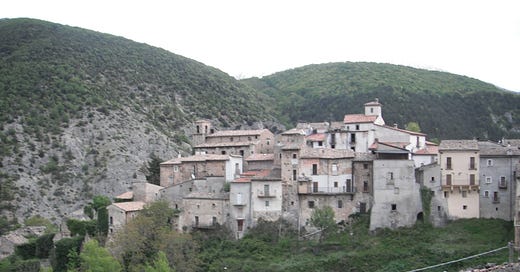


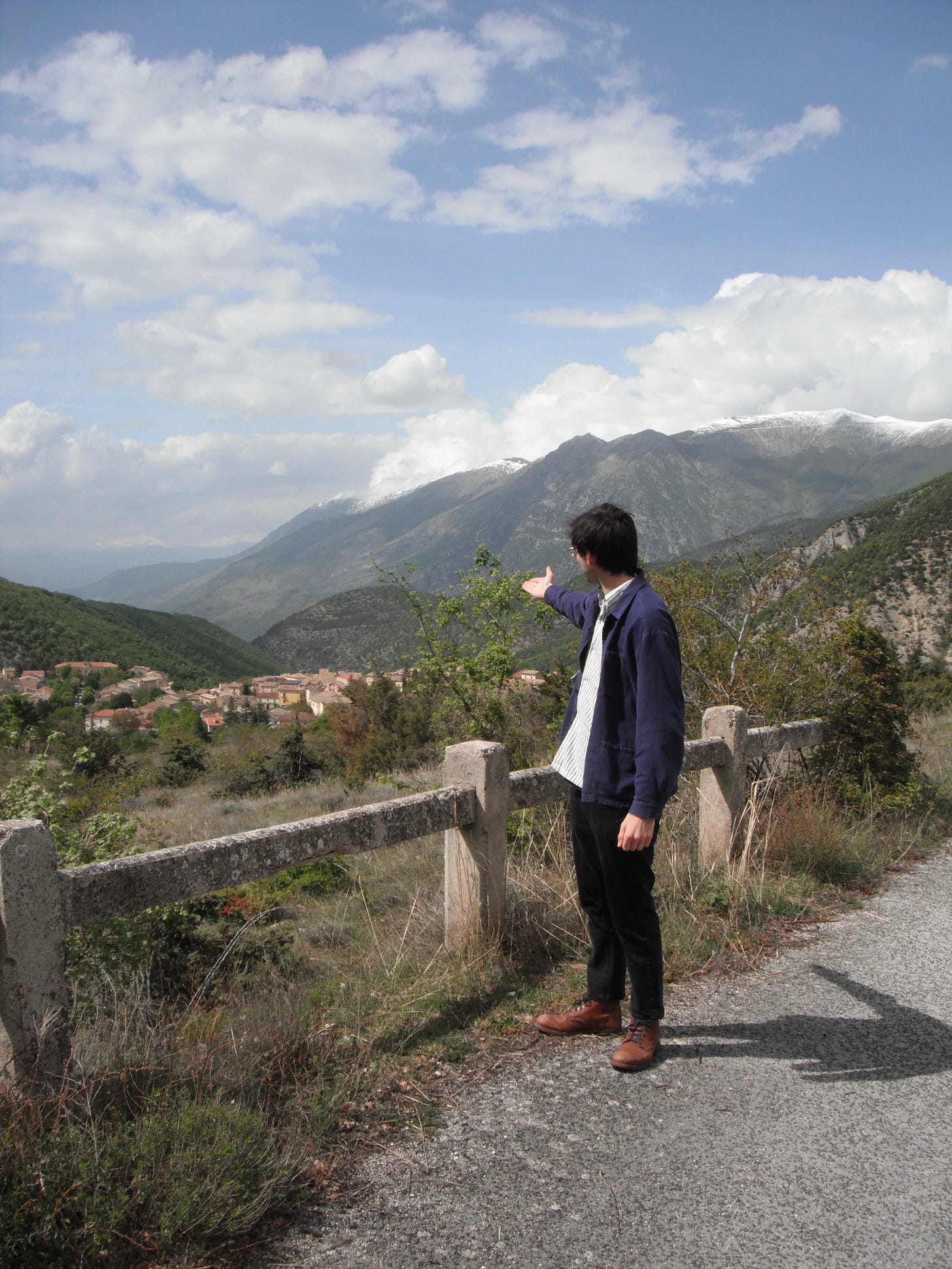
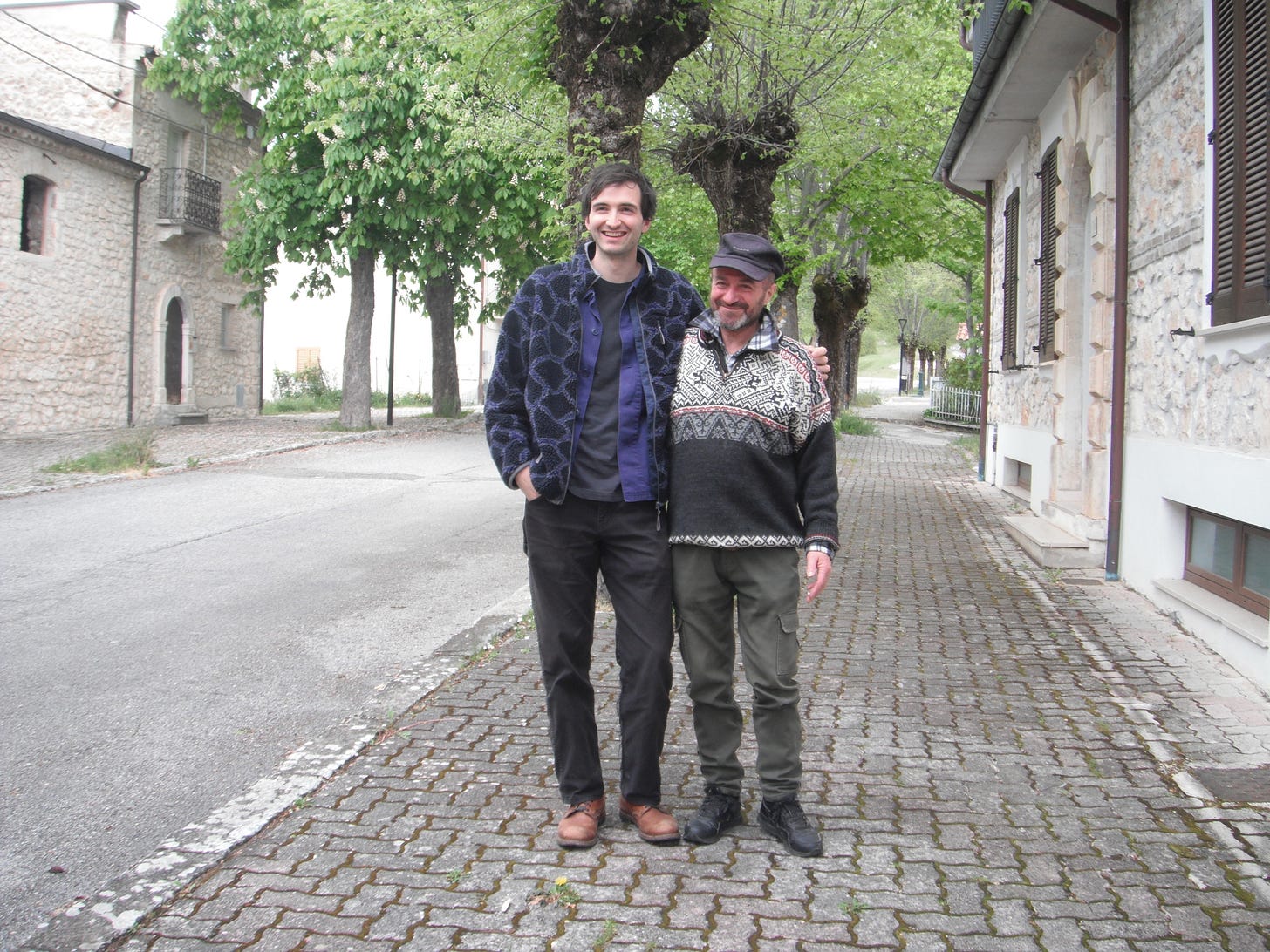
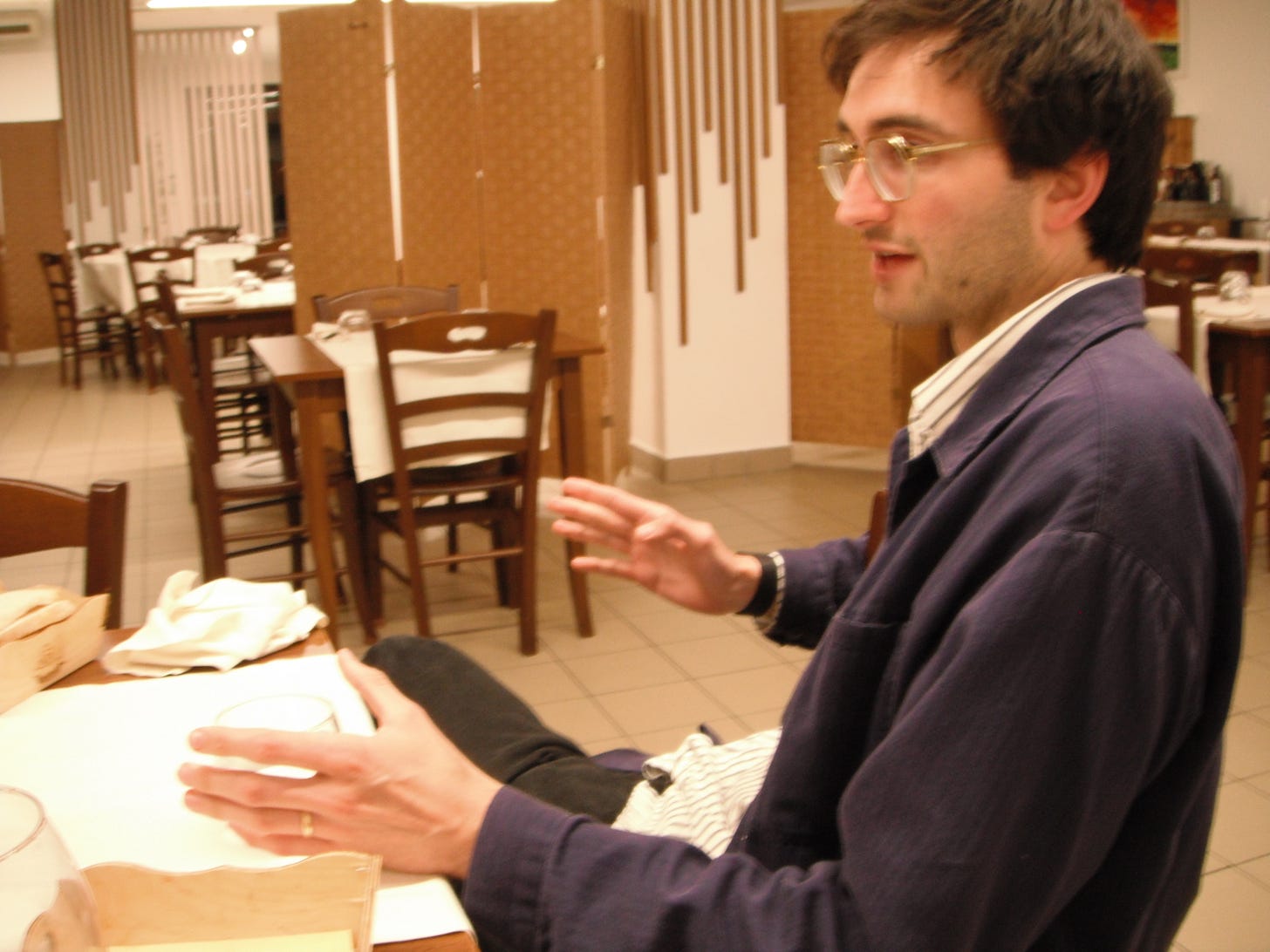
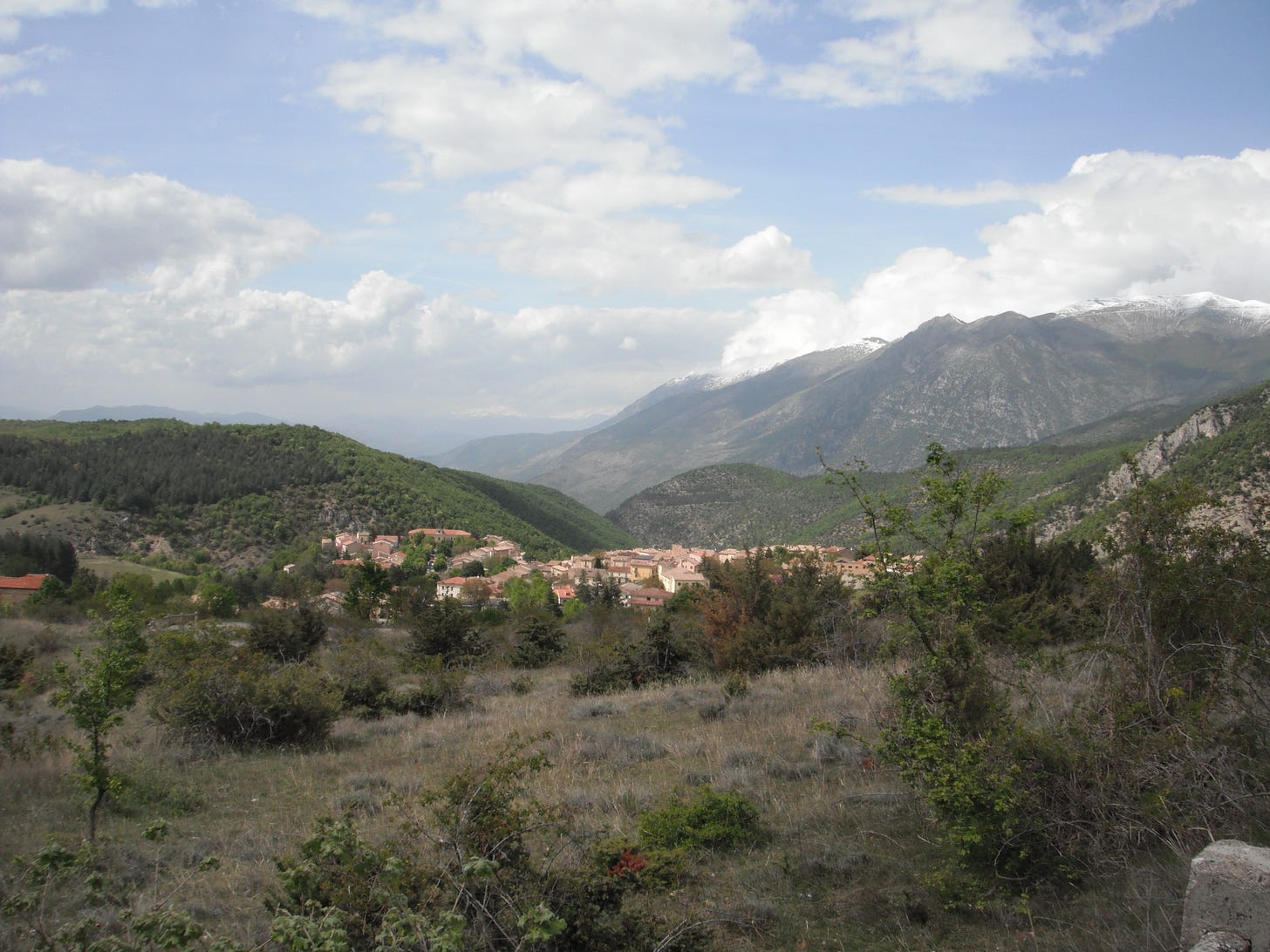

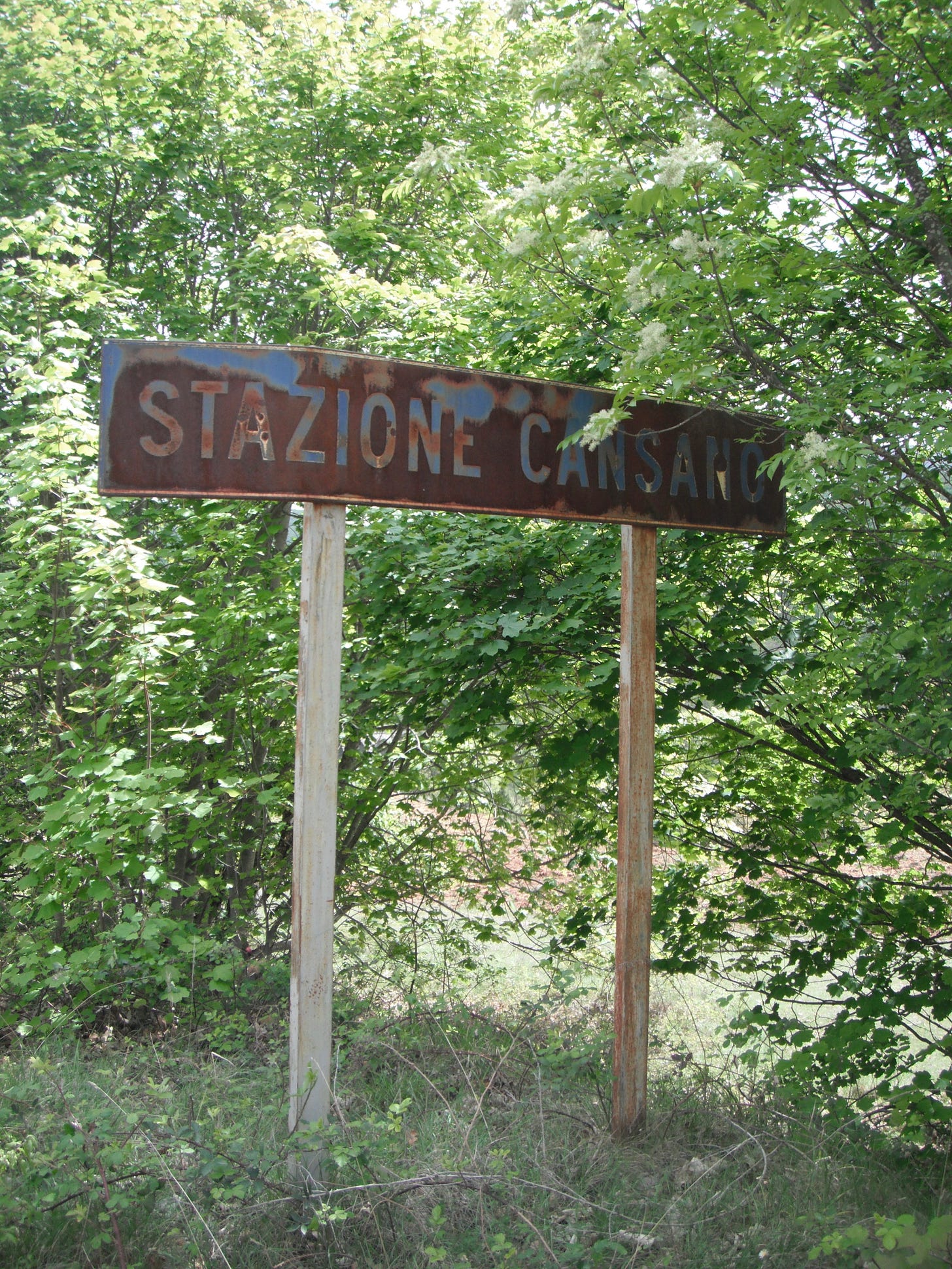

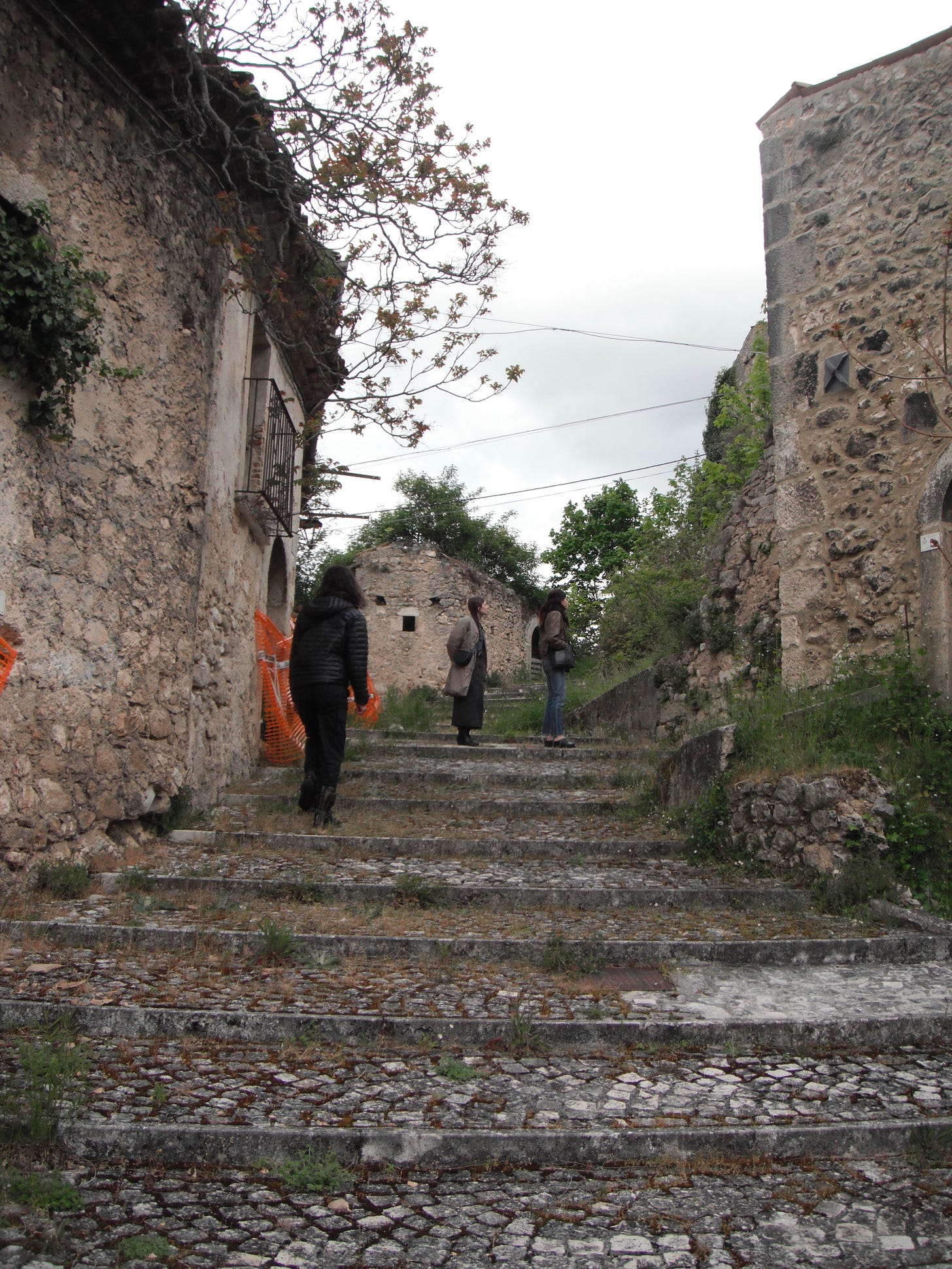





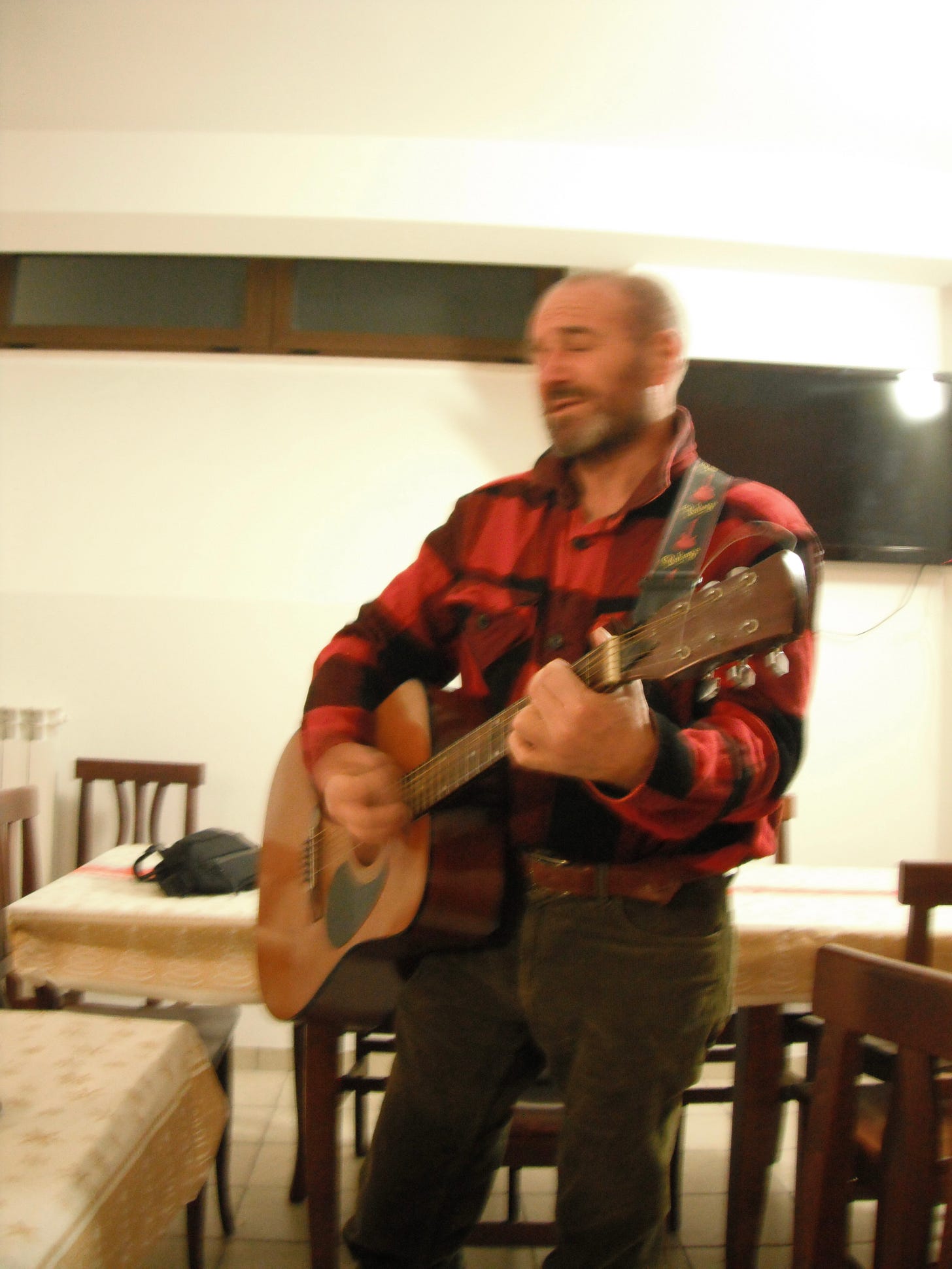
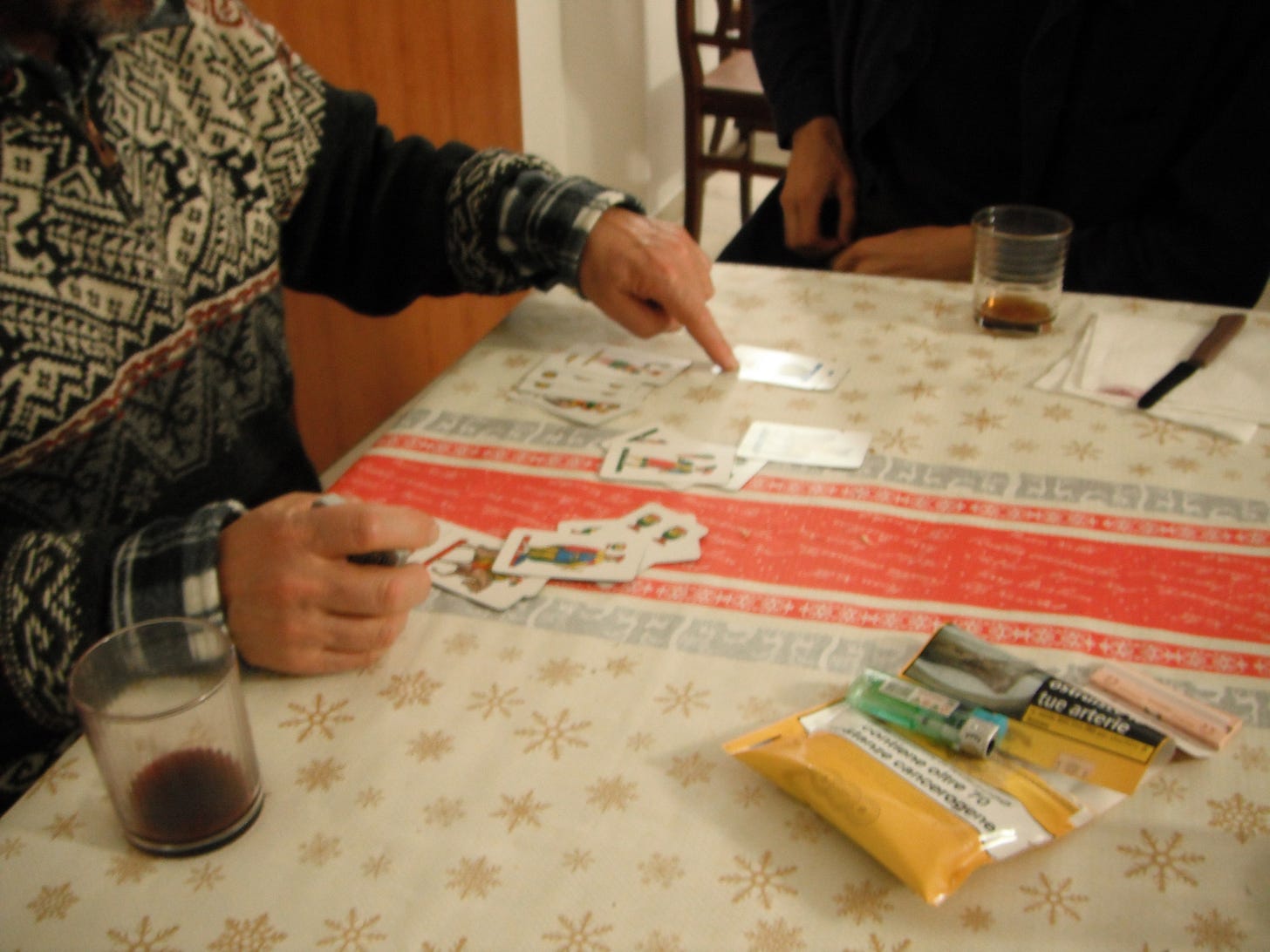
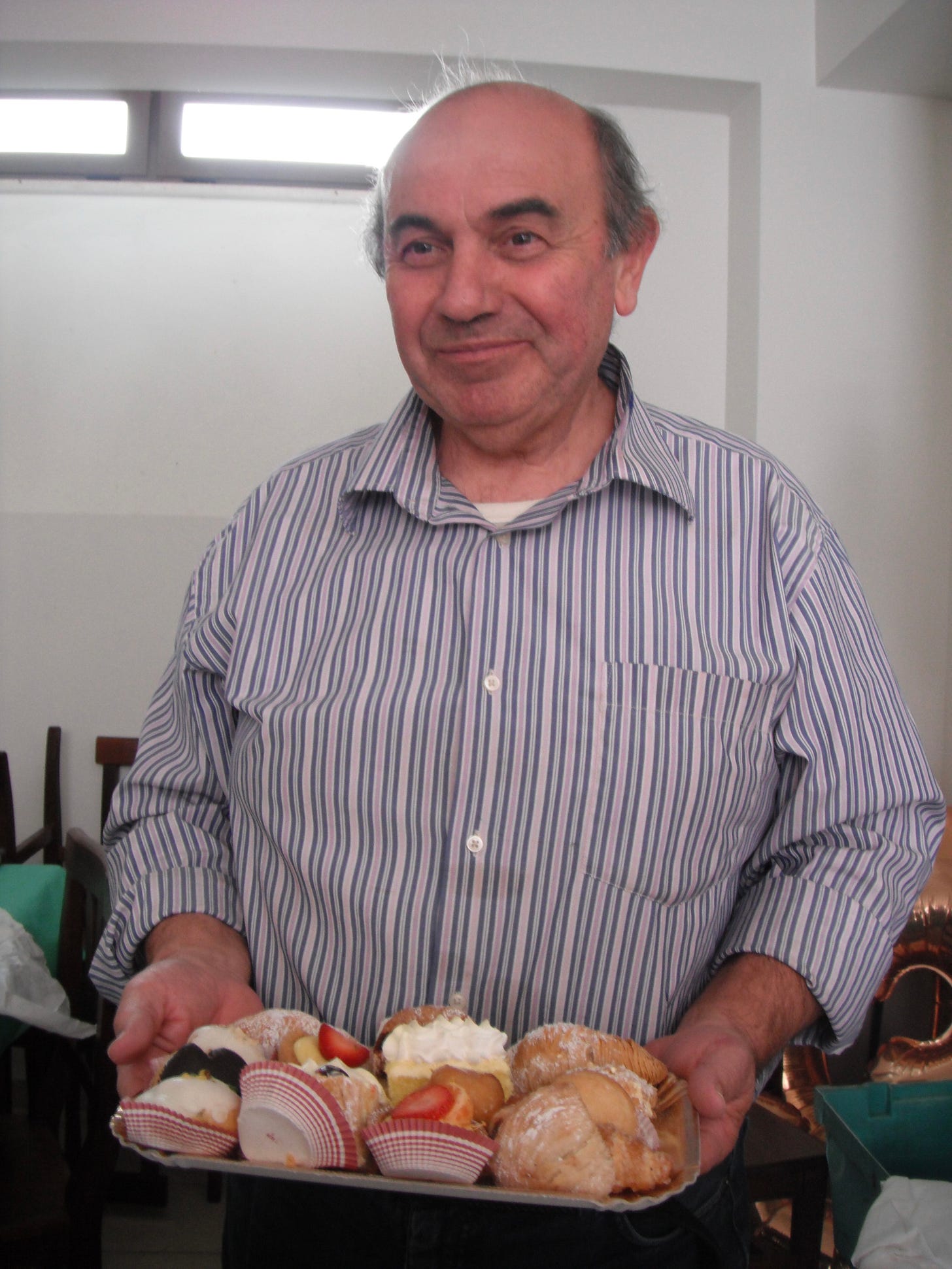
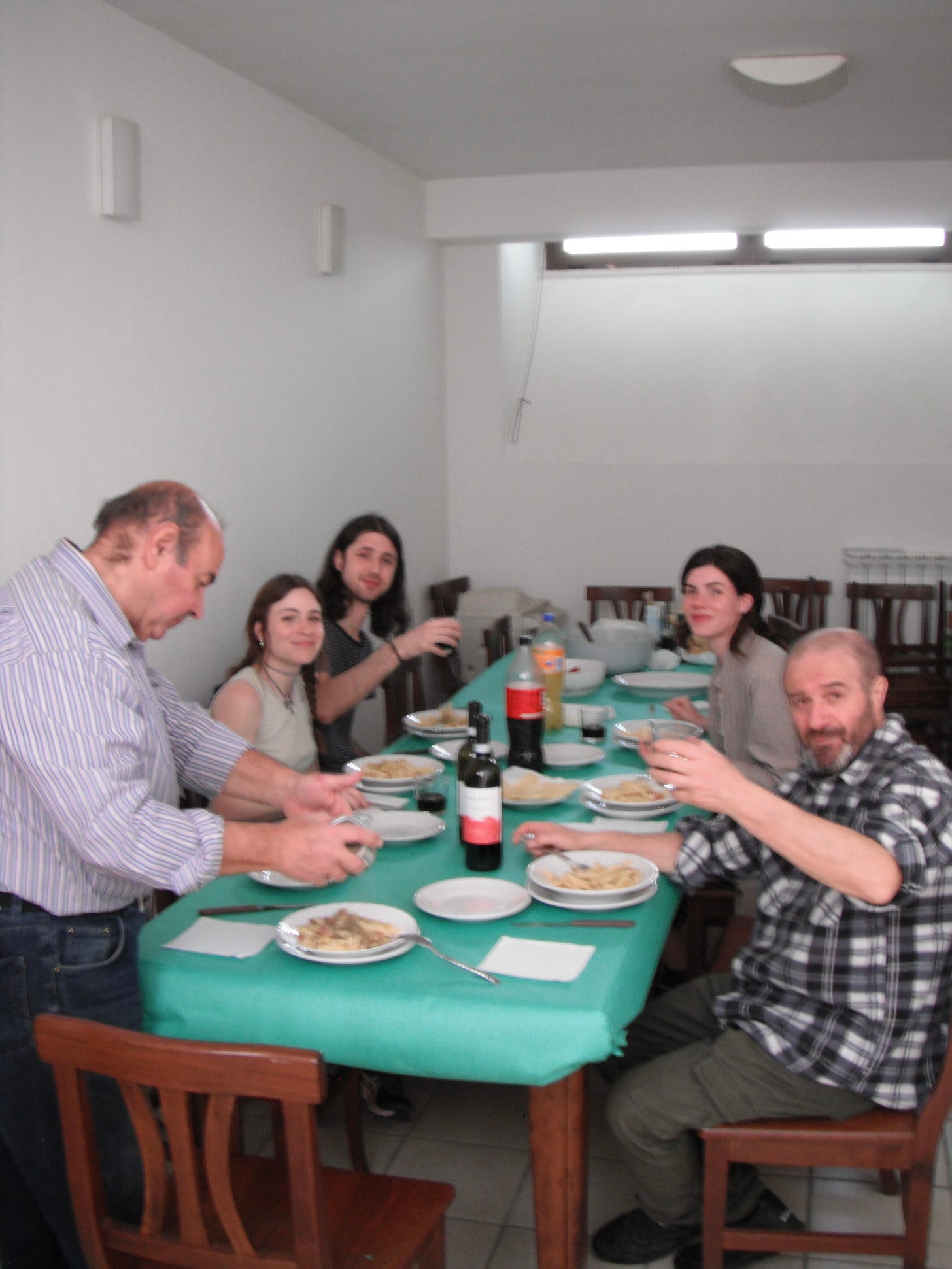
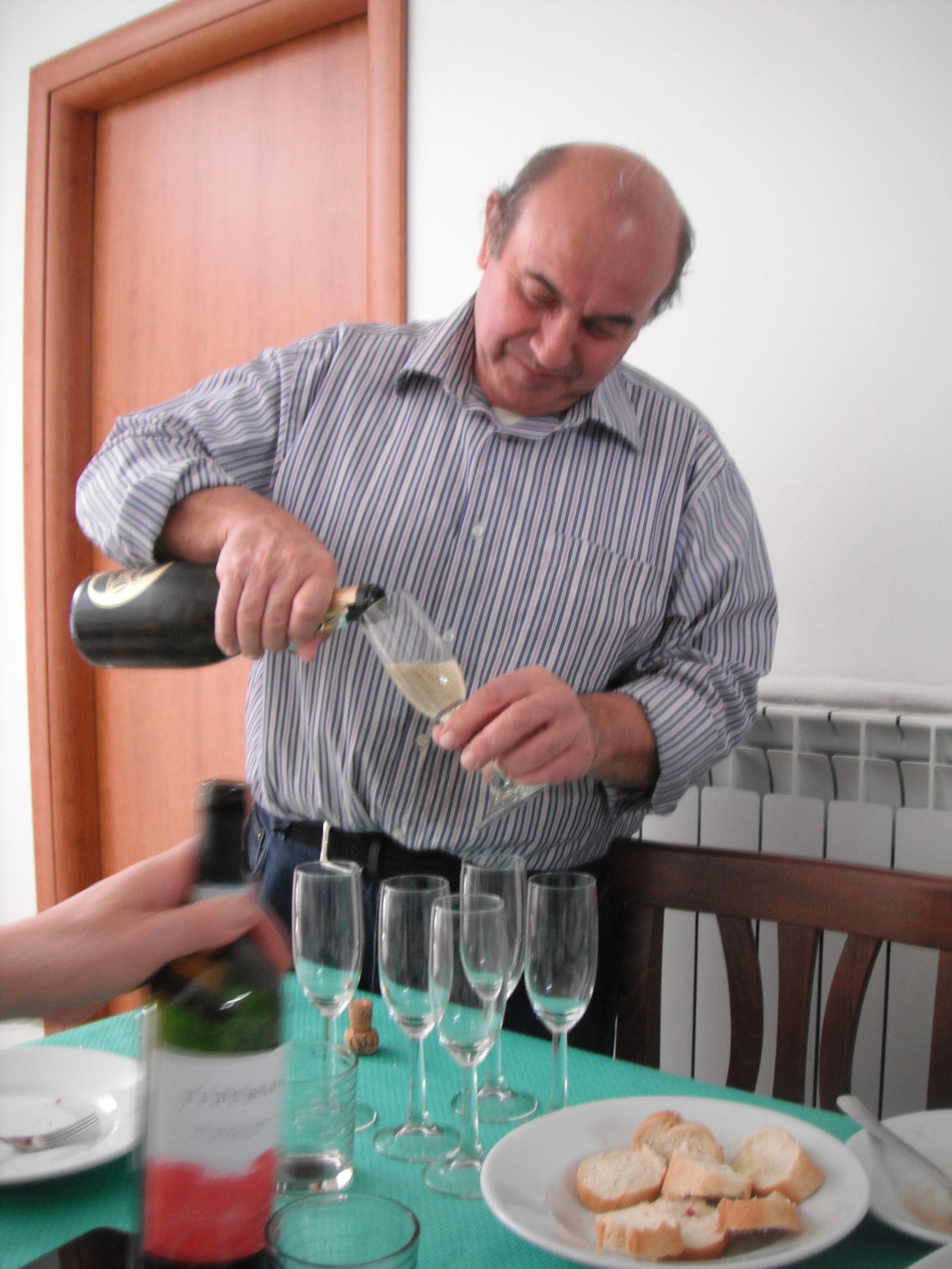
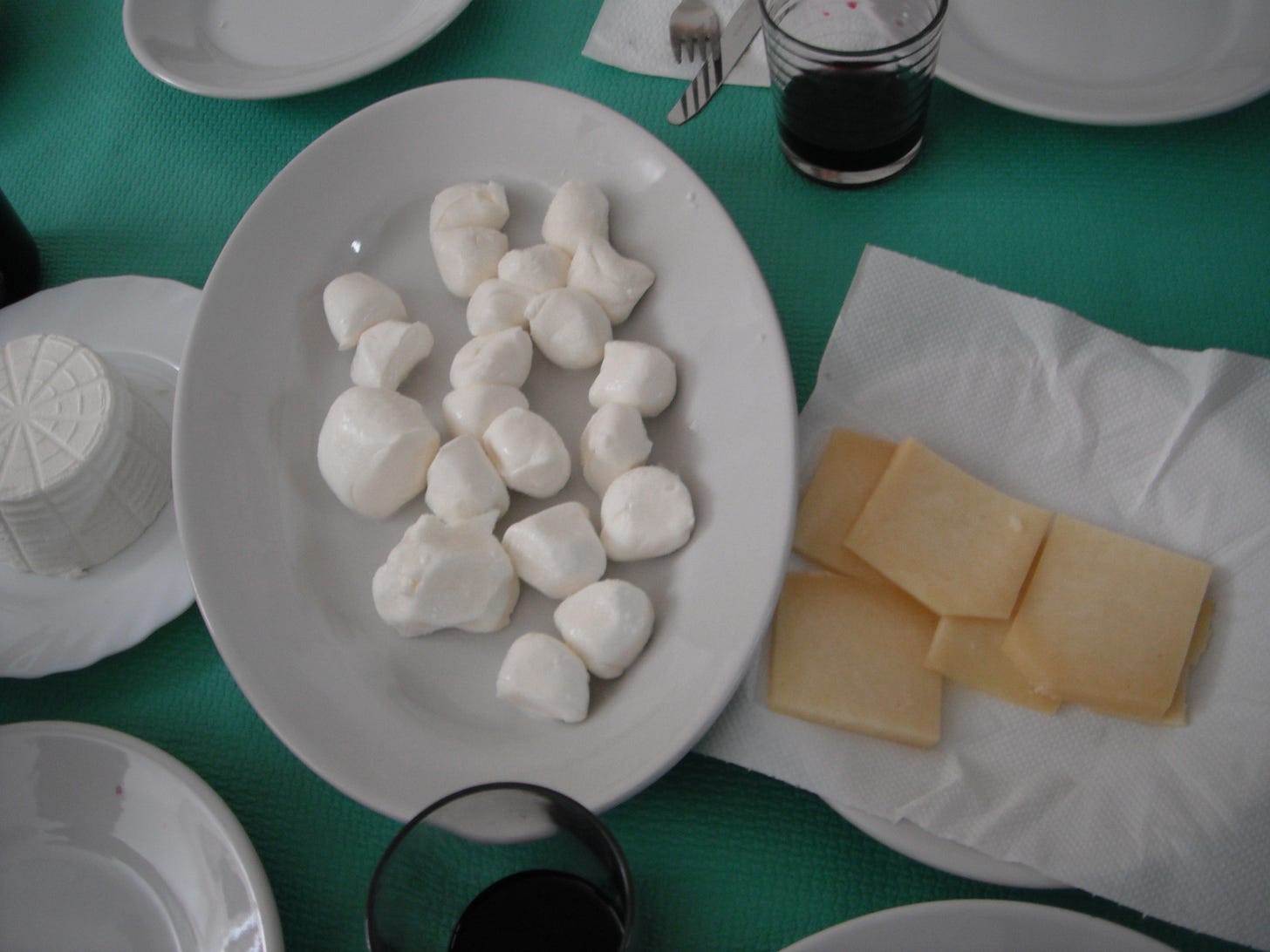



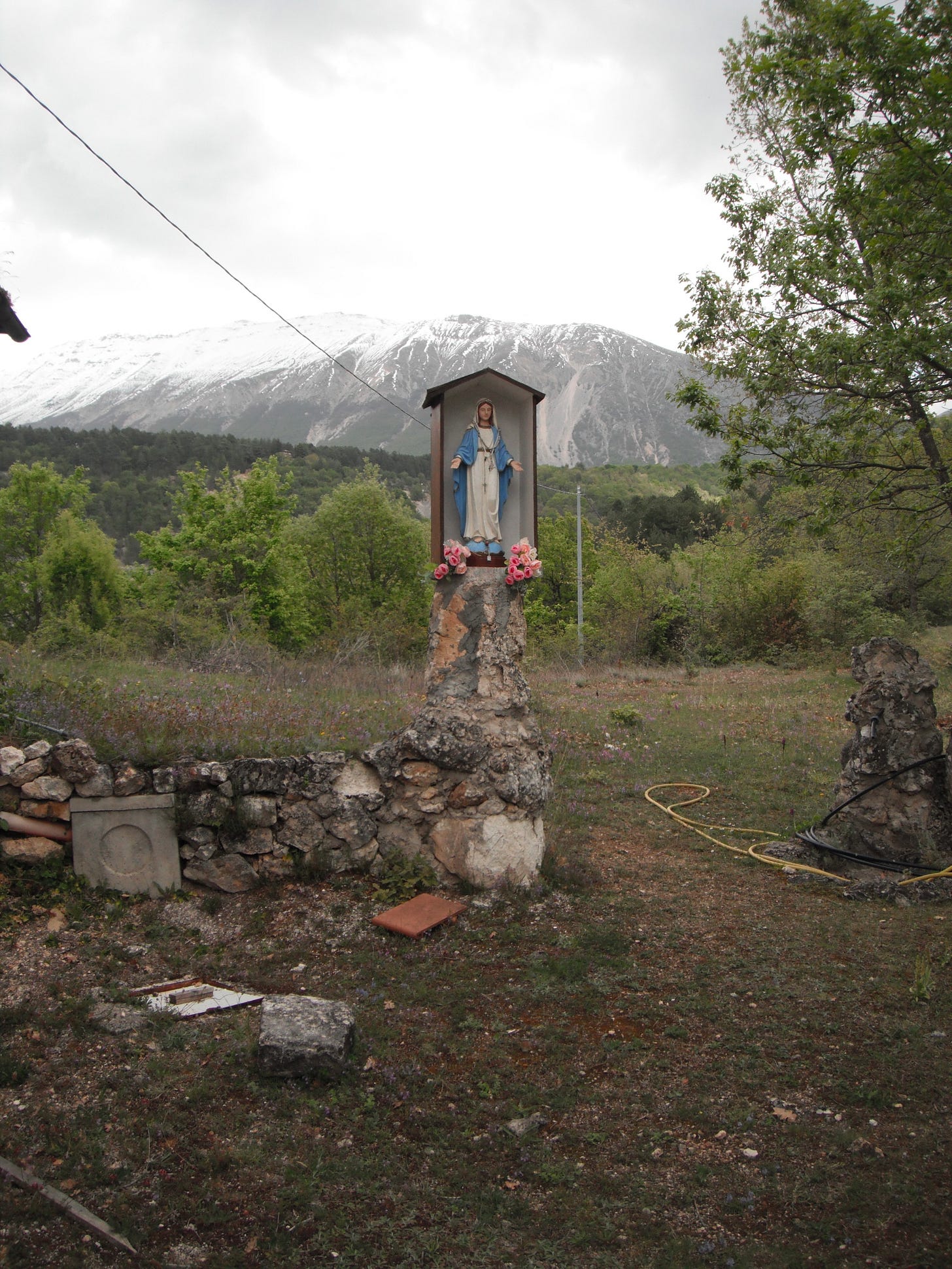
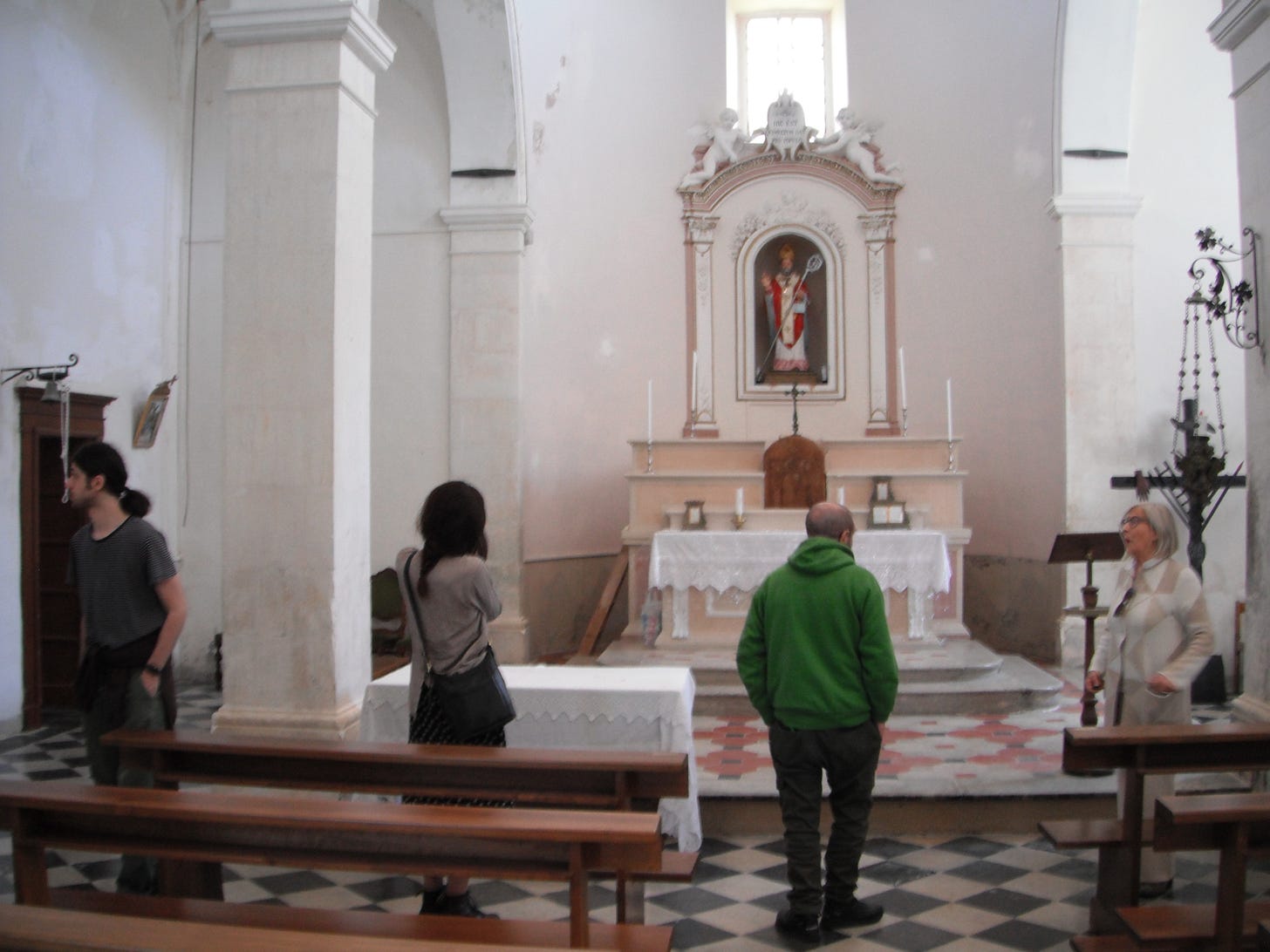

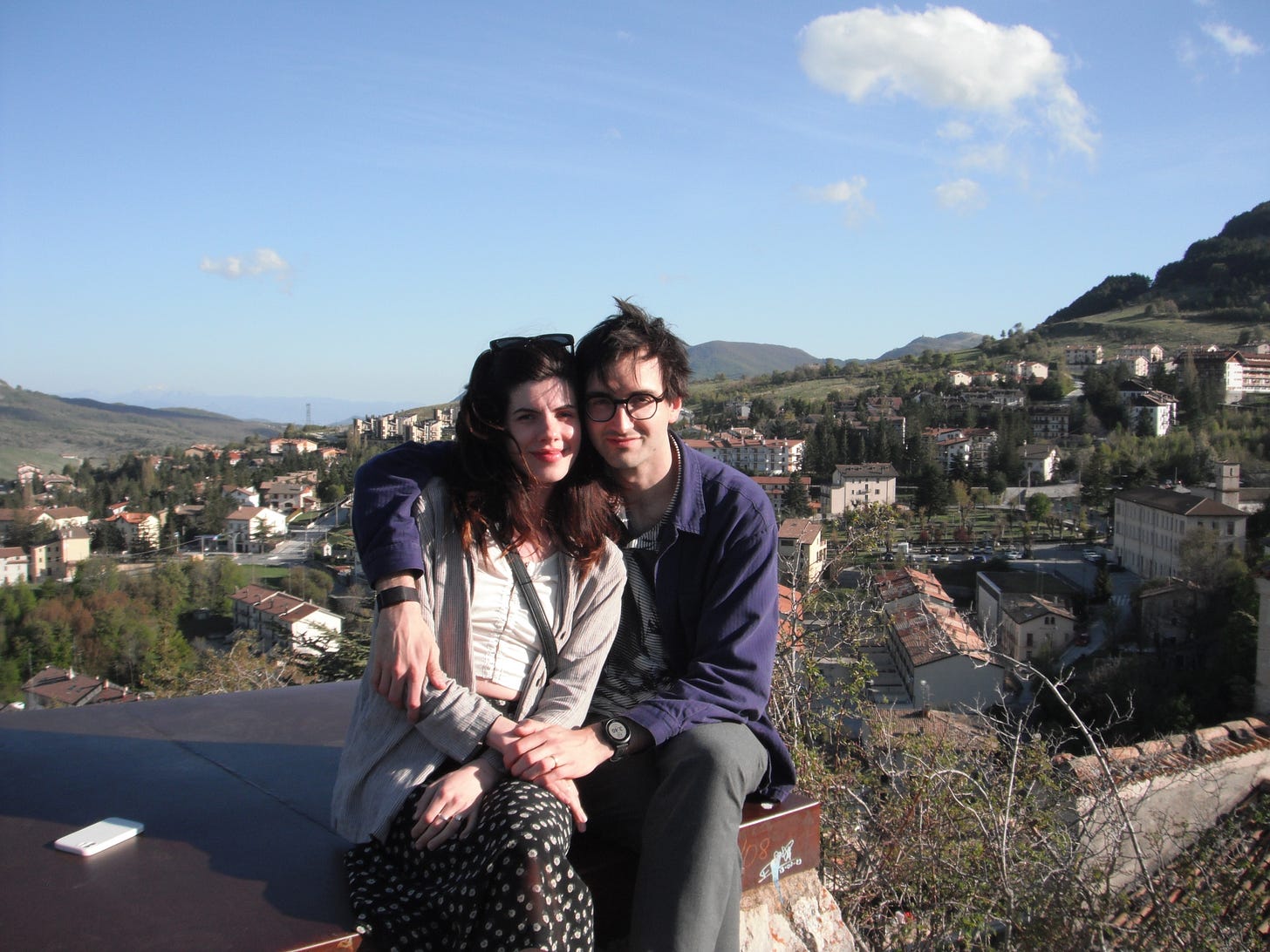
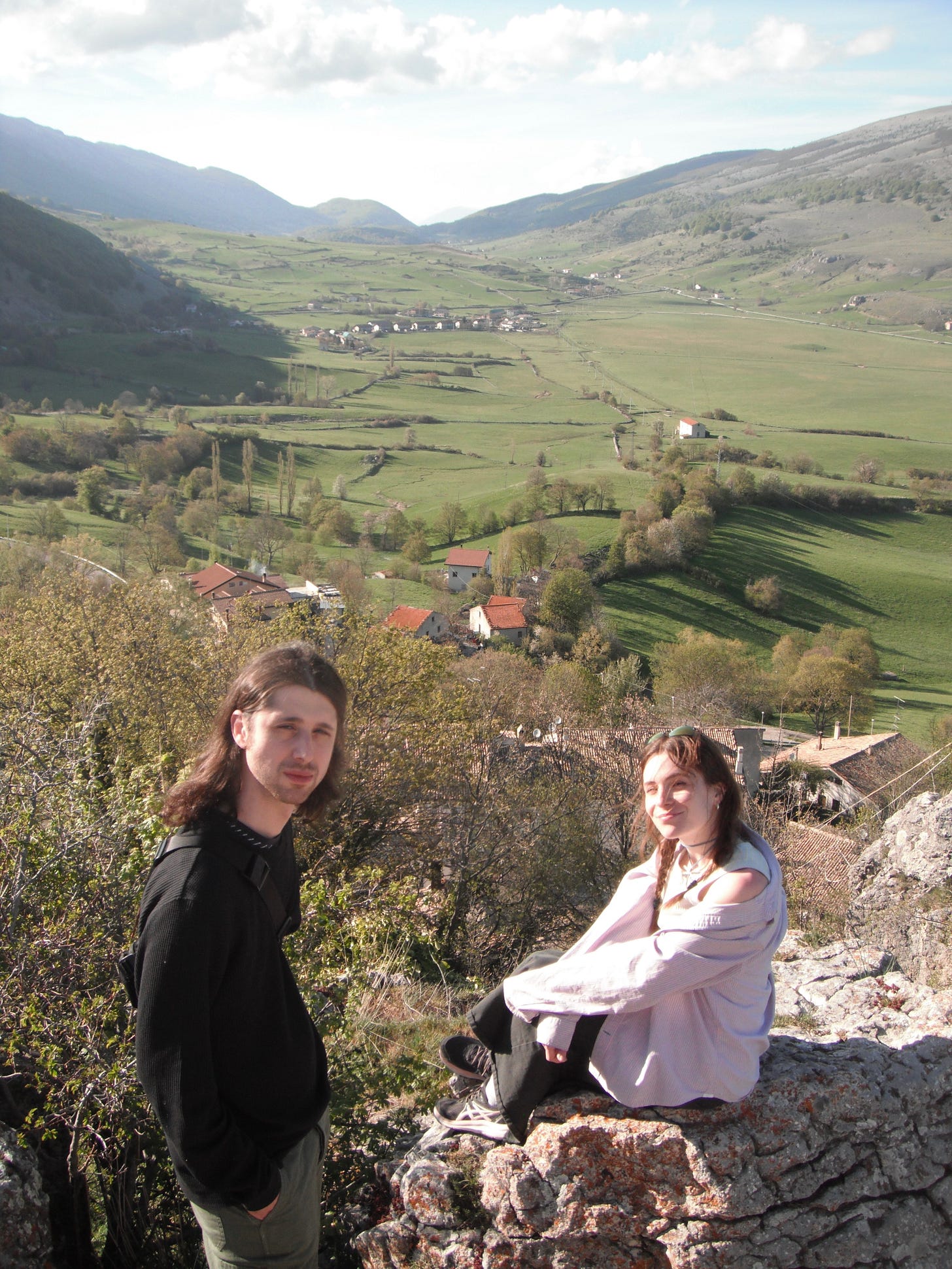
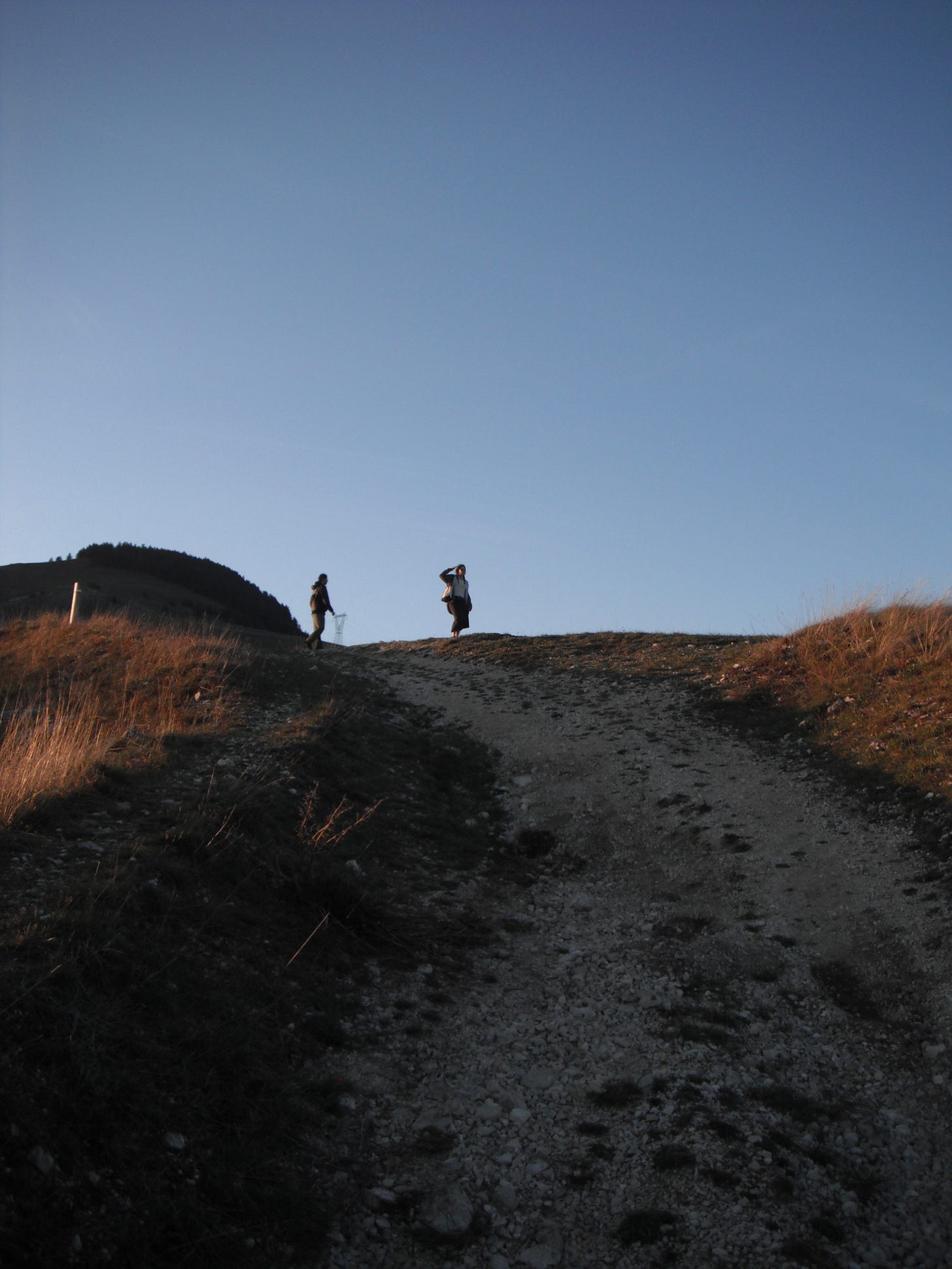
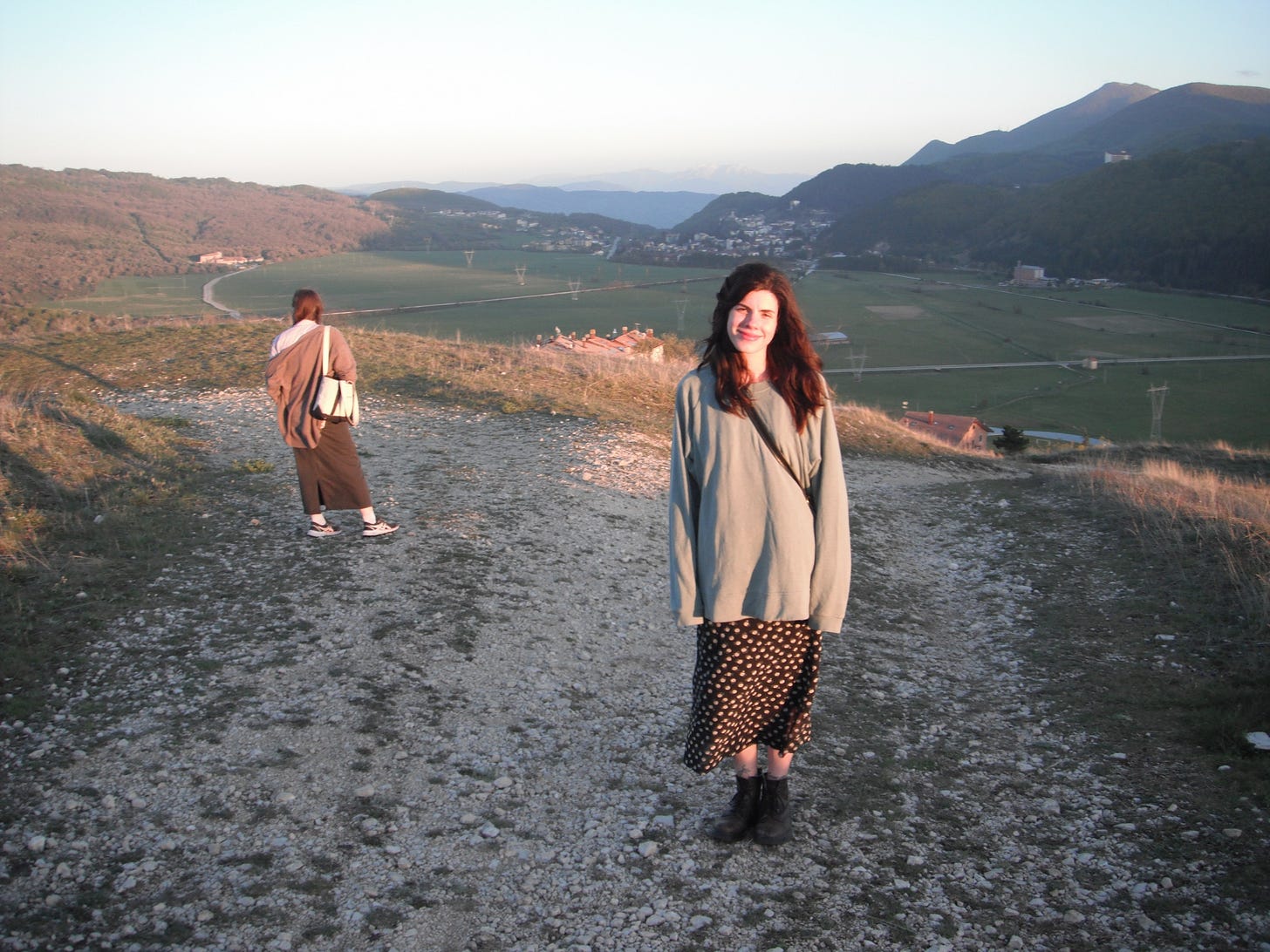
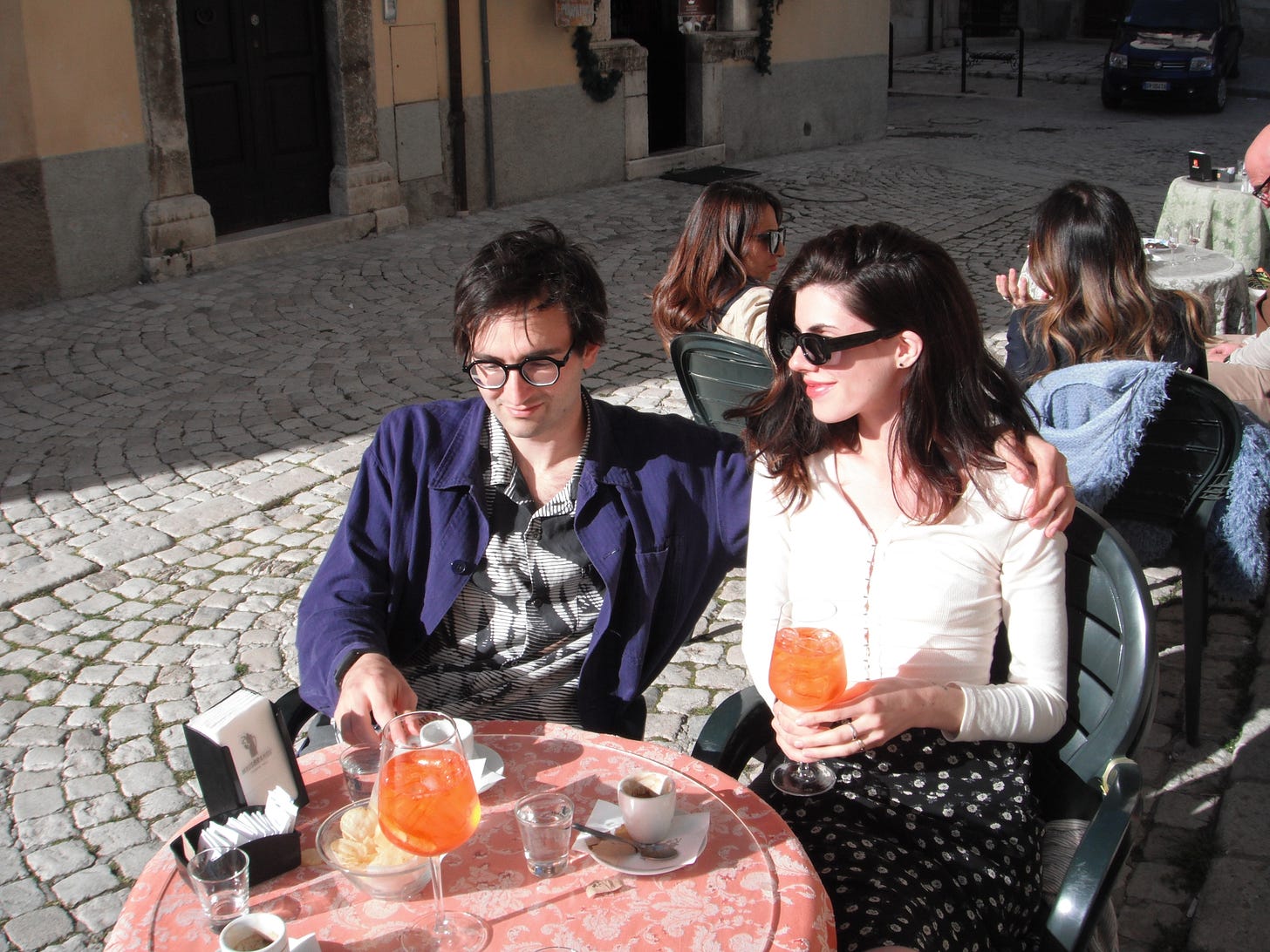
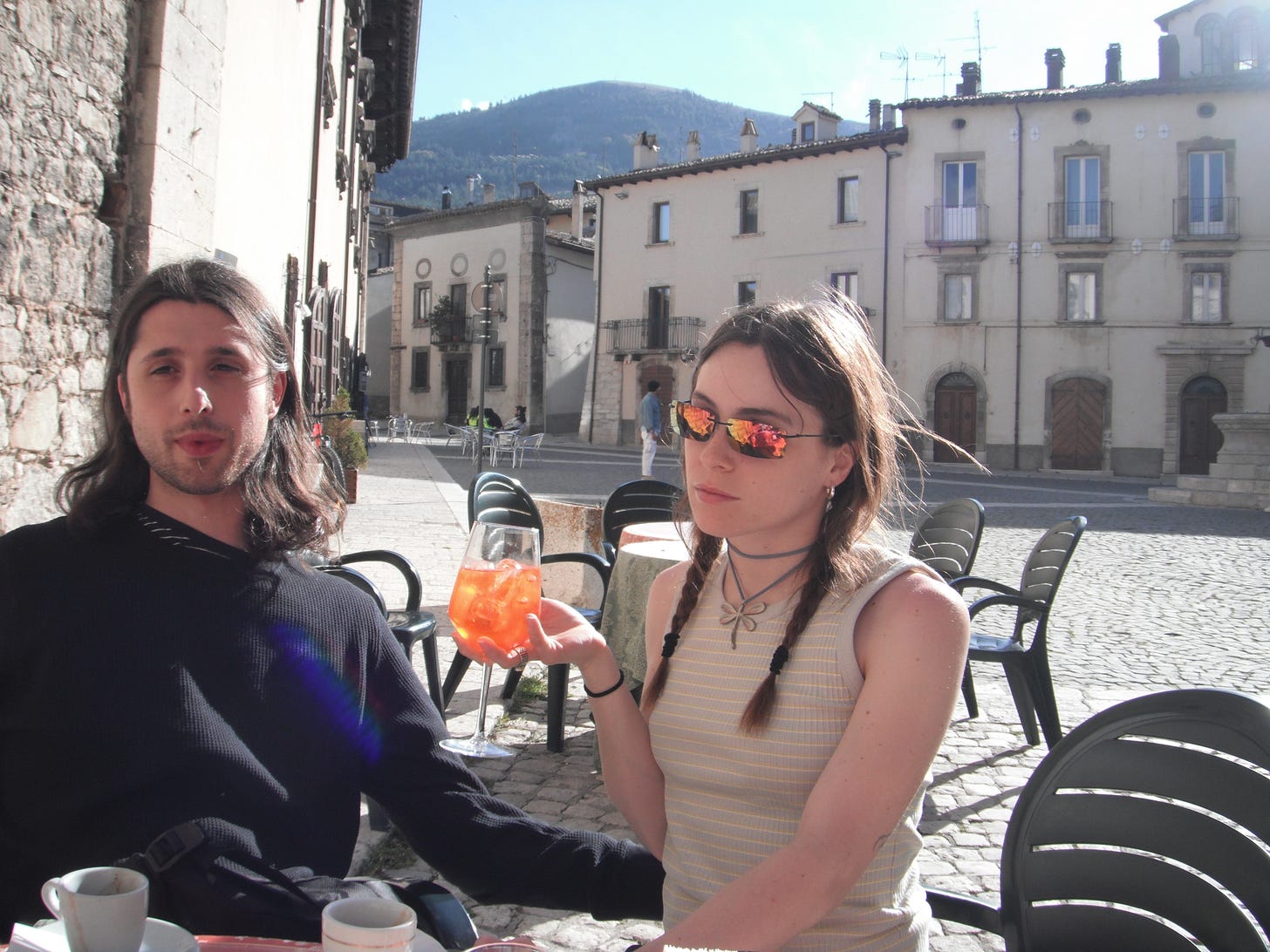
Andiamo!!! 💖💖💖👍
I love this story Donato! Very well written!